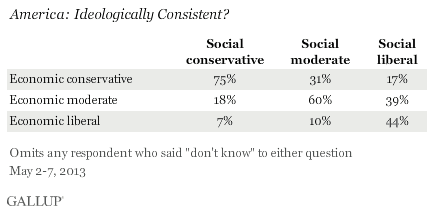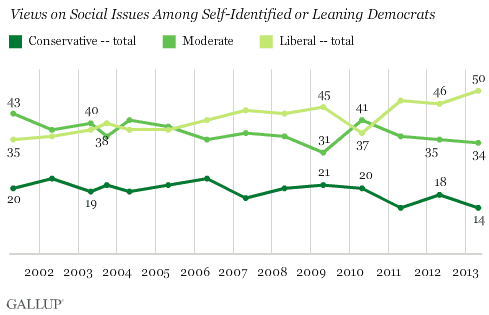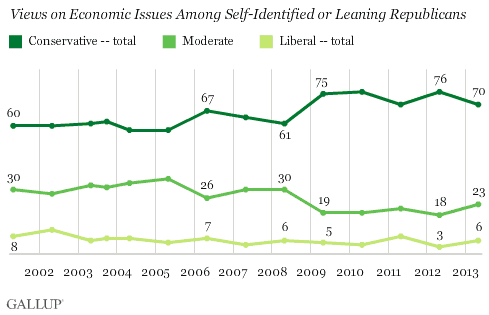WASHINGTON, D.C. -- Forty-one percent of Americans now characterize their economic views as "conservative," or "very conservative," the lowest since President Barack Obama took office in 2009 and on par with where views were in May 2008. This year's downtick in the percentage of Americans identifying as economically conservative has been accompanied by an uptick in the percentage identifying as economically moderate -- now 37% of Americans, up from 32% last year.
![Trend: Thinking about economic issues, would you say your views on social issues are -- [ROTATED: very conservative, conservative, moderate, liberal, (or) very liberal]?](http://content.gallup.com/origin/gallupinc/GallupSpaces/Production/Cms/POLL/jcvvtxforum_lydy39svlq.gif)
The percentage of Americans calling themselves economic liberals has remained virtually unchanged from last year at 19%, and has not fluctuated much since 2001.
The findings are based on Gallup's annual Values and Beliefs poll, conducted May 2-7. Since 2001, the poll has asked Americans to say whether they are liberal, moderate, or conservative on "economic" and, separately, "social" issues. The interpretation of what qualifies as social or economic issues is left to the respondent; the question does not define or provide examples of these types of issues.
These results contrast with the general ideological trend Gallup measured during Obama's first term, which saw a renewed sense of Americans' self-professed conservatism, particularly in economic matters -- a phenomenon that could have reflected a backlash against the perceived liberal policies of the Democratic president.
While economic liberalism remains stagnant, the percentage of Americans describing their social views as "liberal" or "very liberal" has achieved a new peak of 30% -- in line with Gallup's recent finding that Americans are more accepting on a number of moral issues. Thirty-five percent of Americans say they are conservative or very conservative on social issues and 32% self-identify as socially moderate.
![Trend: Thinking about social issues, would you say your views on social issues are -- [ROTATED: very conservative, conservative, moderate, liberal, (or) very liberal]?](http://content.gallup.com/origin/gallupinc/GallupSpaces/Production/Cms/POLL/v0dz0cyzyuashrsufgfrfq.gif)
Most Americans are ideologically consistent in their views of economic and social issues. For individuals who gave an answer to both questions, 75% of social conservatives also considered themselves economic conservatives, while 60% of social moderates were also economic moderates. Social liberals were less "consistent," with a slim plurality, 44%, saying they were also economically liberal.

"Pure" conservatives -- individuals who say they are conservative in both policy spheres -- make up a substantial portion of self-identified or leaning Republicans, 63%. Pure liberals, by far less common than their ideological polar opposites, are a less sizable contingent of the Democratic Party, constituting 28% of its overall base.
Half of Democrats Now Identify as Socially Liberal
While the nation may be a house divided on social issues, self-identified or "leaning" Democrats appear to be moving toward consensus. Half now say their social views are liberal or very liberal; this figure was 35% in 2001 and 37% as recently as 2010. Fewer Democrats say they are socially moderate -- down nine percentage points since 2001 -- or socially conservative, down six points.

Republicans and Republican-leaning independents have remained fairly consistent in terms of their social ideology -- six in 10 consider themselves social conservatives, hardly moved from 57% in 2001. Few Republicans identify as socially liberal.
Republicans' Economic Conservatism Still Strong
Most self-identified or leaning Republicans, 70%, describe their economic views as conservative, similar to outsized levels first achieved in 2009. That year, identification as economically conservative among Republicans was 75%, an increase of 14 points from the prior year.

Democrats and Democratic leaners, on the other hand, are more likely to see themselves as economic moderates (48%) rather than economic liberals (31%), and this has generally been the case since 2001.
Implications
For much of President Obama's first term, economic conservatism appeared to be on the rise and social conservatism saw modest gains as well. In 2009, a record 42% of Americans said they were social conservatives, while in 2010, a high of 51% said they were economically conservative. This trend may have foreshadowed the 2010 midterms, in which Republicans gave congressional Democrats a memorable "shellacking" by winning a large number of seats in the House of Representatives and the Senate.
This new survey shows changes in Americans' ideology: economic conservatism is at a five-year low, while social liberalism has registered its highest support -- though it remains to be seen whether the changes will continue. On the one hand, for economic ideology, this may be a return to the "normal" rate measured in past polls but momentarily disrupted by a number of factors over the last four years, including the economic recession, the Democrats' control of most of the federal government, and the healthcare debate. By comparison, the 41% of Americans now calling themselves economic conservatives nearly mirrors the eight-year average (42%) observed during the Bush administration.
On the other hand, the trend suggests that ideological attitudes in the country may be shifting. Social liberalism has grown by six points since 2001 and now attracts half of rank-and-file Democrats and Democratic leaners. It is possible that Americans are returning to a certain sense of normalcy on economic ideology, while social ideology continues to charter new ground.
Survey Methods
Results for this Gallup poll are based on telephone interviews conducted May 2-7, 2013, on the Gallup Daily tracking survey, with a random sample of 1,535 adults, aged 18 and older, living in all 50 U.S. states and the District of Columbia.
For results based on the total sample of national adults, one can say with 95% confidence that the margin of sampling error is ±3 percentage points.
Interviews are conducted with respondents on landline telephones and cellular phones, with interviews conducted in Spanish for respondents who are primarily Spanish-speaking. Each sample of national adults includes a minimum quota of 50% cellphone respondents and 50% landline respondents, with additional minimum quotas by region. Landline telephone numbers are chosen at random among listed telephone numbers. Cellphone numbers are selected using random digit dial methods. Landline respondents are chosen at random within each household on the basis of which member had the most recent birthday.
Samples are weighted to correct for unequal selection probability, nonresponse, and double coverage of landline and cell users in the two sampling frames. They are also weighted to match the national demographics of gender, age, race, Hispanic ethnicity, education, region, population density, and phone status (cellphone only/landline only/both, cellphone mostly, and having an unlisted landline number). Demographic weighting targets are based on the March 2012 Current Population Survey figures for the aged 18 and older U.S. population. Phone status targets are based on the July-December 2011 National Health Interview Survey. Population density targets are based on the 2010 census. All reported margins of sampling error include the computed design effects for weighting.
In addition to sampling error, question wording and practical difficulties in conducting surveys can introduce error or bias into the findings of public opinion polls.
View methodology, full question results, and trend data.
For more details on Gallup's polling methodology, visit www.gallup.com.
